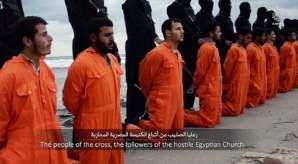[[ Hi Sister Laurel, I have several questions about the requirement of Canon 603 that bishops supervise the life of the diocesan hermit. What does this mean? I mean that the canon reads "under the supervision of the bishop" and seems to be talking about the whole scope of the canon. So does it mean he meets regularly with the hermit and assumes an active supervisory role or that he acts in other ways to assure the hermit's well-being, and such? Also, what happens when a new bishop comes into the picture --- does he simply inherit responsibility for the hermit or can he ask the hermit to go through some vetting process all over again? I have read [someone] who believes this is important and should be implemented. What happens when a bishop chooses not to oversee the hermit's vocation, does that ever happen? What I am thinking is that the supervision of the bishop might refer just to the initial discernment and formation but not to ongoing discernment. Would you agree?]]
Thanks for the questions. I have answered some of them in the past, so please do check out the labels in the right-hand column for further information. As I read the Canon it establishes a relationship of mutual responsibility between the hermit who is to be a diocesan hermit, and the bishop of the diocese. I don't think anything else makes sense. One cannot profess and consecrate a person to eremitical life lived under the supervision of the local bishop and then allow them to go without such supervision!! However, you raise a very good question when you ask what such supervision must look like. Must it be a hand's-on direct supervision where the bishop meets annually or bi-annually with the hermit (or even more frequently if the bishop has the time and inclination), or can the job of direct supervision be placed in someone else's hands? The canon is not specific here and leaves things up to the discretion of the bishop it seems to me.

When I was petitioning for admission to (perpetual) profession, the Vicars for Religious (we had two under Bishop Vigneron) asked me to select a "delegate" who would serve as a "quasi-superior" on my behalf and on behalf of the bishop and diocese. I would be unlikely to be meeting particularly frequently with him, and they wanted to be sure both I and the diocese were served by what we tend to call today, "the ministry of authority". A canonical hermit is not a lone wolf. She is not professed and consecrated and then turned loose to do whatever she wants in whatever way she wants. She has rights and obligations she is expected to meet. Even more importantly, because of her stricter separation and significant silence and solitude, she requires someone who will come to know her well and work with her in terms of her vocation so she is genuinely a hermit living an ecclesial vocation in and towards the silence of solitude central to C 603 and any eremitical vocation. Usually, bishops are simply not the best people to fill such a role. I am more grateful than I can say to Archbishop Vigneron and to the Vicars for Religious for requiring such an arrangement prior to perpetual profession!!!
Because of this, I have only needed to meet with the bishop once a year or so. For that matter, it would likely be enough for my delegates to do so to give him an accounting of my own vocation as they see it. (I have 2 Religious Sisters who serve as co-delegates or Directors.) Even so, bishops need to learn from their diocesan hermits and it is ideal for bishops to meet with the hermit's delegate(s) and also with the hermit approximately annually. Sometimes, however, when new bishops come into the picture things fall through the cracks. Since I first petitioned for admission to c 603 standing, my diocese has seen 5 bishops. One of these professed and consecrated me, one was merely interim and had the Vicar for Religious communicate with me, two inherited me from the bishop who professed me, and of these two, one met with me annually (more frequently if I needed to do so), and the other, though introduced to me, informed that he was my legitimate superior, and assured that the diocese had all of my contact information, has simply been less available than the others, nor have I pressed the issue. Fortunately, my co-delegates serve me and the diocese well in keeping their fingers on the pulse points of my life, calling, and work so this has not been problematical.
.jpg)
So, I have had bishops that assume direct responsibility for my vocation and others that supervise my vocation less directly. I think both arrangements,
presuming both involve real communication with hermits and/or delegates, work well. What is not acceptable in terms of the canon and the vocation itself is for a bishop to refuse to accept any responsibility for a hermit who is publicly professed in his diocese --- and I have certainly heard stories about this kind of situation from across the country. Usually, this occurs when a new bishop is ordained or installed. Sometimes he has no experience with hermits at all and does not understand the vocation; sometimes he may not believe in the vocation itself; sometimes he seems to believe he is just too busy (and perhaps too important) to meet with a lowly hermit by him/herself and seeks to meet with any diocesan hermits present in the diocese as a group. And sometimes things just fall through the cracks (which can include the gatekeepers to the bishop's appointment calendar, etc.)
The bottom line in all of this is that Canon 603 legislates a vocation that is to be lived under the REAL supervision of the local ordinary. If the hermit assumes rights and obligations in making profession or being consecrated under this canon, so too does ANY bishop who takes on the reins of diocesan leadership in a diocese with c 603 hermits --- no matter how he feels about c 603 or those professed accordingly! Regarding the idea that when a bishop moves on, retires, dies, etc., and a new bishop assumes leadership of the diocese, any diocesan hermit should go through the vetting typical of initial formation and discernment yet again, let me say straight out that that is one of the silliest ideas I have ever heard. Remember that we are dealing with the church's own theology of consecrated life and that with initiation into the consecrated state of life one is initiated into a STABLE state of life where a life commitment can grow in whatever direction and to whatever depth and extent God wills it. The situation you have described would completely vitiate any sense of stability or persistent meaningfulness in such a vocation. It would thus, also compromise one's ability to grow in it as exhaustively as one is called to do. For this one needs a truly perpetually binding commitment.

Bishops DO die; some become Archbishops and move to an Archdiocese, while others retire or ask to be moved to another diocese or Military Ordinariate (now Archdiocese). Since beginning to live as a hermit @ 1984, I personally have seen 5 bishops go and come. Should I really have been made to redo professions again and again? And what of consecration? God consecrates on the occasion of one's perpetual profession and one enters the consecrated
state of life. Yes, the state can be undone, but not the consecration!! Why would we act in such a way with what is both a hardy and a fragile gift? And what about what we recognize as admission to PERPETUAL profession? Do we simply admit to temporary profession again and again and never allow the person to make a definitive or life commitment leading to God's own consecration of the person for the whole of her life???
Our world is changeable enough. We really do need people making various life commitments. More, we need to believe in the possibility of life commitments!! We need to be able to celebrate them in ways that really recognize their value to the church and the whole of society! I have watched Sisters dealing with the completion of their congregations' work as numbers dwindle. It is both one of the saddest and most inspiring things I have ever experienced. Day in and day out Sisters renew life commitments and pour out their lives in light of these professions. They do not say, "Wow, this is difficult, this isn't what I signed up for. At the end of the year, instead of making vows again, I will just leave for something easier"!! Other Sisters recognize the difficulty of living together with all kinds of personalities -- especially as everyone ages. Life commitments don't allow them to say, "You know, Sister x is really a pain in the behind (and well she might be!); let's ask her to go through another mutual discernment process and get her out of here when the time comes for her vows to expire." No, they have life commitments, not just to serve the church, but to love one another and to serve one another in community!! It is the quality of the commitment that keeps us going forward and growing more deeply rooted when things become difficult or take turns we never anticipated or expected. Love requires commitments and I think to pour out one's whole heart --- one's whole being --- one requires a perpetual or definitive commitment.
There is a kind of quantum leap made between a temporary profession and a definitive, solemn, or perpetual profession, even though we always make vows with the idea that we are called to them the rest of our lives. While discernment is always part of our daily lives, we do not continue to anguish over or consider things in the way we do before making a definitive/life commitment. That has been done, usually several times before admission to perpetual profession. Once we have committed ourselves for the whole of our lives, the discernment shifts focus from some version of [[Do I or do I not truly have this vocation?]] to variations on [[What is my place in this stream of vocational tradition? How do I live this historical reality out with integrity in this time and this place?]] In community life, discernment involves questions about the direction, growth, and leadership of the congregation, the nature and shape of the congregation's charism and mission, how one is uniquely called to carry these into the world, and so forth. In eremitical life, there are similar questions regarding eremitical tradition, the nature and charism of the vocation, the important values brought to this world in this space and time, etc. Once a definitive commitment has been made, one lives into the vocation as one whose entire life has been summoned to it and given over to it and to the God who gives it to the world through us. One now knows oneself as "gift-bearer" in a way the temporarily committed simply cannot do.

With regard to hermits per se, if a bishop is leaving the diocese and the publicly professed hermit is only temporary professed, yes the incoming bishop
could ask for a new discernment process; he
could ask for a longer period of temporary vows --- which means he could ask the hermit renew a temporary commitment so that he might be truly sure of this vocation himself before admitting to perpetual profession.
What is more likely is that the outgoing bishop will admit such a hermit to perpetual profession before he leaves, assuming the recommendations of all involved in working with the person encouraged this. If the hermit is not yet professed but it is clear as it can be that she has this vocation, then the departing bishop can admit to temporary vows. It is unlikely the incoming bishop will not listen to the people working with the candidate and their recommendation to admit to perpetual profession when the time for that comes. We act in good faith in entering into such processes of discernment and formation, and we trust that everyone will act in a similar way as the process unfolds.
Sometimes that trust is betrayed, and sometimes mistakes are made in discernment while formation can be inadequate and require more attention. Yes. (Though formation will always continue throughout one's life.) There is a reason the Bishop's Decree of Approval/ Rule of Life said in regard to my own Rule, [[I pray that this Rule of Life proves advantageous in living the eremitical life.]] Yes, the remainder of the decree was entirely positive, but when dealing with Divine Vocations we can only do what we can truly do. Everything, including ongoing discernment and formation, and the deepening of the vocation, must be left in God's hands. What we know is that God calls persons to such vocations and consecrates them perpetually to his service and love. We must trust this I think, and respond as corresponding grace empowers us to do.
I sincerely hope this is helpful.
 And so, in Jesus' life and active ministry, the presence of God is made real in space and time in an unprecedented way --- that is, with unprecedented authority, compassion, and intimacy. He companions and heals us; he exorcises our demons, teaches, feeds, forgives and sanctifies us. He is mentor and brother and Lord. He bears our stupidities and fear, our misunderstandings, resistance, and even our hostility and betrayals. But the revelation of God as Emmanuel means much more besides; as we move into the Triduum we begin to celebrate the exhaustive revelation, the exhaustive realization of an eternally-willed solidarity with us whose extent we can hardly imagine. In Christ and especially in his passion and death God comes to us in the unexpected and even the unacceptable place. Three dimensions of the cross especially allow us to see the depth of solidarity with us our God embraces in Christ: failure, suffering unto death, and lostness or godforsakenness. Together they reveal our God as Emmanuel --- the one who is with us as the one from whom nothing can ever ultimately separate us because in Christ those things become part of God's own life.
And so, in Jesus' life and active ministry, the presence of God is made real in space and time in an unprecedented way --- that is, with unprecedented authority, compassion, and intimacy. He companions and heals us; he exorcises our demons, teaches, feeds, forgives and sanctifies us. He is mentor and brother and Lord. He bears our stupidities and fear, our misunderstandings, resistance, and even our hostility and betrayals. But the revelation of God as Emmanuel means much more besides; as we move into the Triduum we begin to celebrate the exhaustive revelation, the exhaustive realization of an eternally-willed solidarity with us whose extent we can hardly imagine. In Christ and especially in his passion and death God comes to us in the unexpected and even the unacceptable place. Three dimensions of the cross especially allow us to see the depth of solidarity with us our God embraces in Christ: failure, suffering unto death, and lostness or godforsakenness. Together they reveal our God as Emmanuel --- the one who is with us as the one from whom nothing can ever ultimately separate us because in Christ those things become part of God's own life. In perhaps the most powerful passage I have ever read on the paradox of the cross of Christ, John Dwyer (my major professor until doctoral work) speaks about God's reconciling work in Jesus --- the exhaustive coming of God as Emmanuel to transform everything --- in this way:
In perhaps the most powerful passage I have ever read on the paradox of the cross of Christ, John Dwyer (my major professor until doctoral work) speaks about God's reconciling work in Jesus --- the exhaustive coming of God as Emmanuel to transform everything --- in this way: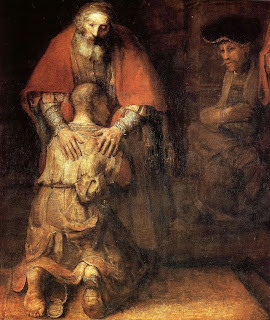 [[Jesus is rejected and his mission fails, but God participates in this failure, so that failure itself can become a vehicle of his presence, his being here for us. Jesus is weak, but his weakness is God's own, and so weakness itself can be something to glory in. Jesus' death exposes the weakness and insecurity of our situation, but God made them his own; at the end of the road, where abandonment is total and all the props are gone, he is there. At the moment when an abyss yawns beneath the shaken foundations of the world and self, God is there in the depths, and the abyss becomes a ground. Because God was in this broken man who died on the cross, although our hold on existence is fragile, and although we walk in the shadow of death all the days of our lives, and although we live under the spell of a nameless dread against which we can do nothing, the message of the cross is good news indeed: rejoice in your fragility and weakness; rejoice even in that nameless dread because God has been there and nothing can separate you from him. It has all been conquered, not by any power in the world or in yourself, but by God. When God takes death into himself it means not the end of God but the end of death.]] Dwyer, John C., Son of Man Son of God, a New Language for Faith, p 182-183.
[[Jesus is rejected and his mission fails, but God participates in this failure, so that failure itself can become a vehicle of his presence, his being here for us. Jesus is weak, but his weakness is God's own, and so weakness itself can be something to glory in. Jesus' death exposes the weakness and insecurity of our situation, but God made them his own; at the end of the road, where abandonment is total and all the props are gone, he is there. At the moment when an abyss yawns beneath the shaken foundations of the world and self, God is there in the depths, and the abyss becomes a ground. Because God was in this broken man who died on the cross, although our hold on existence is fragile, and although we walk in the shadow of death all the days of our lives, and although we live under the spell of a nameless dread against which we can do nothing, the message of the cross is good news indeed: rejoice in your fragility and weakness; rejoice even in that nameless dread because God has been there and nothing can separate you from him. It has all been conquered, not by any power in the world or in yourself, but by God. When God takes death into himself it means not the end of God but the end of death.]] Dwyer, John C., Son of Man Son of God, a New Language for Faith, p 182-183.




.jpg)


.jpg)

.jpg)






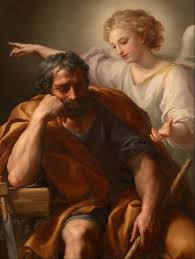
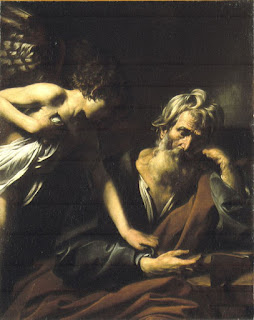

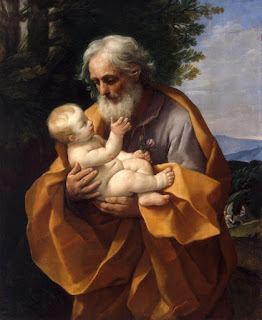

.jpg)
.jpg)
.jpg)
.jpg)
